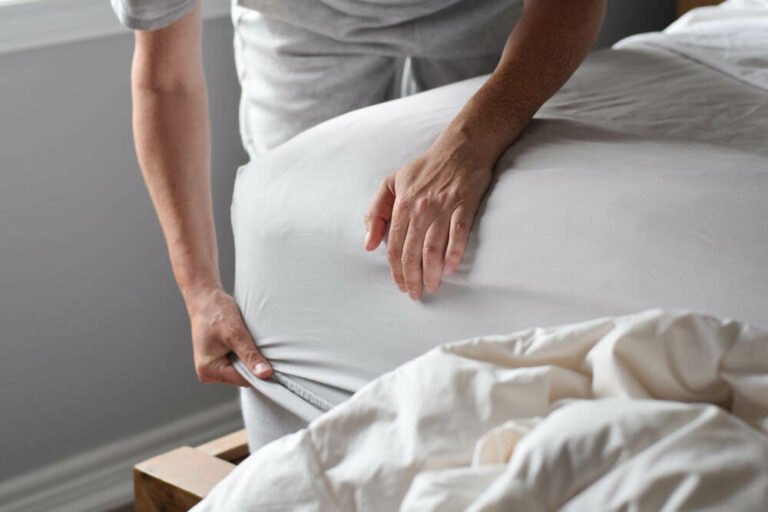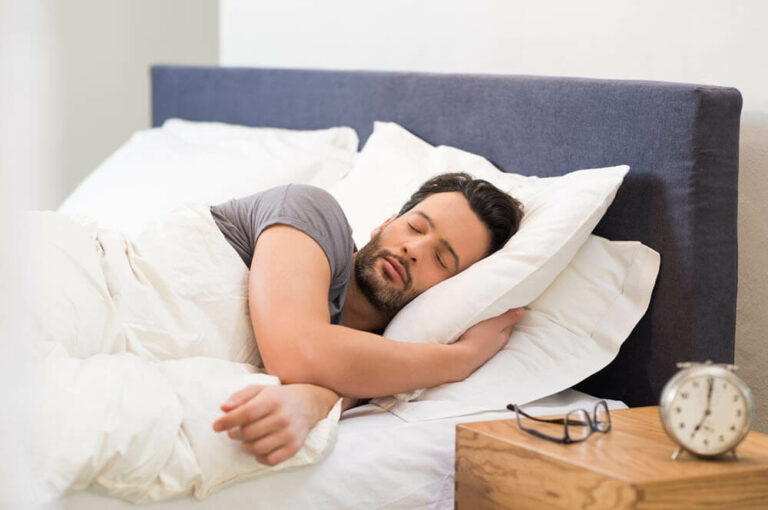Most of us have experienced troubles when trying to fall asleep at some point in our lives, so we know how frustrating it can get. Not being able to fall asleep makes you toss and turn in your bed, and this restlessness can have negative effects on your energy, focus, mood, and overall health.
There are several causes for nighttime restlessness, but if you don’t suffer from sleep apnea or insomnia, it’s most likely a disrupted sleep-wake cycle. Whether you’ve stayed up during the night to study, work, or simply to enjoy your favourite TV show, disrupted sleep patterns can be very annoying, causing you all kinds of sleep problems. Fortunately, there are many methods that can help you get better sleep, and using essential oils for aromatherapy has been one of the most popular in both ancient times and recent years.
In this article, we’ll get into more detail on what essential oils are, how to use them, and what essential oils are most effective so you can have a good night’s sleep.
What Are Essential Oils?
Essential oils are oils extracted from plants. There are various ways in which essential oils are extracted, including steam distillation, expression, and supercritical C02 extraction, and which method is used depends on the type of plant, the parts from which the concentrate is taken, as well as the therapeutic qualities the finished product should possess.
This practice of using essential oils for mental and physical wellbeing is called aromatherapy and has been known since ancient times. And since some essential oils are known for their anti-inflammatory and sedative effects that are believed to have similar effects as the brain chemicals in charge of sleep, they have positive effects on sleep, which is the topic of today’s article.
Essential oils are basically plant concentrations in a liquid state and are considered to be more potent and effective in implementing the benefits of the plant than consuming the actual plant. Keep reading to learn which essential oils can help you get restful sleep, but first, let’s see how you can effectively use them.
How to Use Essential Oils?
There are numerous ways in which you can use essential oils and it’s up to you to decide which method fits your preferences the best. Of course, although aromatherapy is gentle, it still might be a good idea to consult your doctor before using essential oils and learn about the potential side effects.
These are the most common ways in which essential oils are used.
- Put several drops in your air diffuser, which will then spray the scent around the room.
- Boil a pot of water, and add a few drops of essential oil to it. Breathe in the steam it creates. It might be useful to put a towel over your head to make sure that you’re inhaling all of the scents that come from the steam.
- Take a few drops of essential oil and rub them on your wrists, chest, neck, hands, forehead, or feet. And since essential oils are very potent, it’s best to mix it with a carrier oil, like olive, sweet almond, grapeseed, or coconut oil, to avoid causing a reaction. This is especially important if you have sensitive skin.
- Put a few drops of the essential oil on your palm and rub your hands against each other before smelling them.
- Pour several drops into your warm bath before going to sleep.
- Use aromatherapy candles made of wax combined with essential oils.
- Pouring essential oil in hot water and diffusing the mixture in your room, around your bed and pillow, is another great method.
Now that you know how to safely and effectively use essential oils, let’s see the best ones that can help you have a good night’s sleep.
Which Essential Oils Will Help Me Sleep?
Here are the 7 best essential oils for sleep.
Lavender
Lavender is the most popular and most commonly used essential oil. Its calming effect on the nervous system is well known and is related to lavender’s chemical compounds linalool and linalyl acetate. Inhaling steam of boiling water mixed with lavender oil can help battle insomnia, particularly in children, women, and people struggling with mild insomnia. Breathing in the lavender aroma at night can also reduce feeling sleepy in the morning.
Moreover, inhaling lavender essential oil before going to bed can provide restful sleep to new mothers who often experience sleep problems.
Lavender oil can also be used in an essential oil blend, mixed with other essential oils. This mixture can either be poured on the pillow to be inhaled or massaged onto the body until the skin absorbs it. We should note that using lavender aromatherapy combined with sleep hygiene techniques has a better effect on sleep than using lavender essential oil alone.
Valerian
Valerian essential oil is also among the most popular ones for sleep, so it’s no wonder why valerian root can be found in most herbal teas intended for insomnia relief. Valerian’s sedative effect is known for centuries, and it can greatly help those having restless nights. Scientifically speaking, valeric acid located in valerian essential oil inhibits the breakdown of the GABA neurotransmitter, and so has a positive impact on sleep quality.
Valerian essential oil might also help in reducing anxiety, which is related to sleep quality and overall wellness.
Chamomile
Chamomile essential oil is the next on the list of aromatherapies used since ancient times. If you’ve ever experienced insomnia, there’s a great possibility that someone already recommended you to drink chamomile tea before going to bed. After all, its chemical compounds include apigenin, which is known for its sedative effects. Chamomile calms the body, reduces stress, depression, and anxiety, and improves sleep quality. Chamomile also brings other health benefits, such as improvement of vital signs.
As stated before, inhaling essential oils is more effective than consuming the plant, so using chamomile essential oil is definitely a good idea.
We should underline that roman chamomile essential oil is the most potent kind of chamomile extract. Roman chamomile is proven to help with symptoms of anxiety and stress, making room for a good night’s sleep, and potentially reducing nightmares.
Citrus Fruits
Citrus essential oils can be stimulating for some people, and calming for others, depending on the kind of citrus fruit used and the user’s individual reactions.
Bergamot essential oil, for example, is well known for the positive impact it has on restful sleep, as well as for its anxiety-relieving effect, while lemon essential oil can help reduce anxiety and depression. However, in case you don’t find citrus oils to be sleep-inducing for you, avoid using them before going to bed.
Cedarwood
If you’re among those who like the woodsy smell, cedar oil is probably the natural sedative you’re looking for. Cedarwood essential oil calms the body and mind using its chemical compound cedrol, and so inhaling it stimulates the parasympathetic nervous system, and with that improves sleep quality for people of all ages.
It’s worth mentioning that it’s often said that one might need to inhale cedarwood essential oil for at least 20 nights before noticing the calming effects. Again, this is an individual matter, and it differs from person to person. Cedar oil is a great sleep aid, which can prolong the total sleep time and help prevent waking up early in the morning.
Clary Sage
Clary sage is a popular antidepressant, which helps increase sleep quality and reduce levels of the stress hormone cortisol. Cortisol has an effect on our circadian rhythm and is possibly linked with alertness, which we’re trying to overcome here. Clary sage oil may also reduce blood pressure and anxiety, which are also known enemies of good rest.
Ylang Ylang
Ylang ylang essential oil has one of the most sedative effects. Besides being sleep-inducing, ylang ylang oil also reduces blood pressure and lowers heart rate. It releases a very pleasant, fruity scent, which itself feels relaxing. Ylang ylang is known for the positive effects it has on reducing anxiety and stress, and preparing your body to go to sleep, making it another essential oil worth trying out.
Final Words
This marks the end of our pretty comprehensive article on what essential oil helps you sleep. We explained what essential oils are, how to use them, and which ones can help you get better sleep, so we hope you found this post useful.






